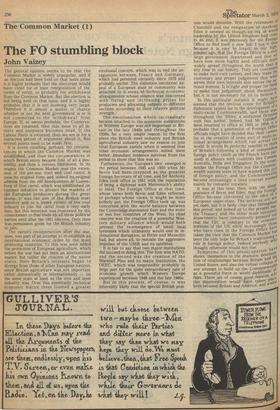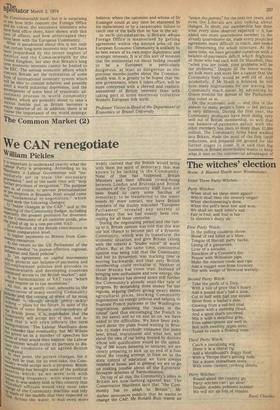The FO stumbling block
John Vaizey
The general opinion seems to be that the Common Market is widely unpopular, and if an election had been held on that issue alone it is highly probable that the electorate would have voted for at least renegotiation of the terms of entry, or probably for withdrawal from the Common Market. But the election is not being held on that issue, and it is highly probable that it is not looming very large. Therefore it is almost a matter of chance whether or not the next government is or is not committed to the 'withdrawal' from Europe. If, as seems probable, the Conservatives are returned, then that issue to all intents and purposes becomes dead. If the Labour Party is returned, then we are in for a sustained period ot argument about it. But several points need to be made first.
It is worth recalling, perhaps, the circumstances in which the Common Market was established, and then the circumstances in which British entry became first of all a possibility and then a serious likelihood. In its origins the Common Market was the extension of the pre-war steel and coal cartel. It took its original form and indeed its original address from the old headquarters in Luxemburg of that cartel, which was established on German initiative to protect the markets of the European producers during the great slump. It was the aim of the British steel industry and to a lesser extent of the coal industry to join the cartel from a very early date, but this intention was frustrated by the commitment to free trade by all three political parties until after the 1931 election. Only then was permission given for the British industry to join.
The cartel's reconstruction after the war, then, was part of an attempt to re-establish an international economic order by the main producing countries. To this was soon added the protection of European agriculture, which before the war had not been an international matter, but rather the concern of the nation states. Here Britain's interests began to diverge from those of other European nations, since British agriculture was not important either domestically or internationally — on the same scale at least as the iron and steel industry was. Over this essentially technical economic matter there loomed a greater emotional concern, which. was to end the antagonism between France and Germany, which had persisted certainly since 1870 and probably earlier. The elaborate emotional appeal of a European state or community was attached to a series of technical economic arrangements whose essence was concerned with fixing and increasing prices for producers and allocating outputs to different sections according to their relative political strength.
The emotionalism which increasingly became attached to the economic institutions. in Western Europe was not important in Britain in the late 1940s and throughout the 1950s, for a very simple reason. In the first place the British steel industry and British agricultural industry saw no reason to join local European cartels when it seemed that other economic arrangements suited them better. Abundant evidence survives from the period to show that this was so.
Furthermore, the 'European idea' emerged in the period between 1945 and 1950 when Mr Bevin had been invented as the greatest Foreign Secretary of all time, and Sir Anthony Eden took office in 1951 with the reputation of being a diplomat with Metternich's ability at least. The Foreign Office at that time, whose views both Bevin and Eden reflected, or perhaps whose views, it might be more politely put, the Foreign Office took up, was concerned with the world balance between the Communist-dominated East and the more or less free countries of the West. Its chief concern was the creation of a powerful Western military alliance which would both prevent the re-emergence of small local tyrannies which ultimately would end in international disruption, as Hitler and Mussolini had, but above all, to restrain the aggressive impulses of the USSR and its satellites.
It is fair to say that two major institutions did succeed in doing this. The first was NATO, and the second was the creation of the Marshall Plan and its major institution, the OEEC, which was responsible probably in large part for the quite extraordinary rate of economic growth which Western Europe experienced between 1948 and the late 1960s.
But in this process, of course, it was inherently likely that the special British posi
tion would diminish. With the retirement of Churchill and the resignation of AnthonY Eden it seemed as though an era of world leadership by the United Kingdom had come to an end. It was necessary for the Foreign Office to find itself a new job. I put it thus because it is easy to forget, in our high' minded age„ that the Foreign Office is a verY large government department and that we have now more highly paid officials more widely spread throughout the world than at any time in our history. They are concerneo to make their own careers, and they make the customary and proper judgement that what serves their own interests also serves the na" tional interest. It is right and proper for the"i to make that judgement about themselves, but it is not necessary for us to believe it. In this particular instanCe it might have seemed that the obvious scope for Britain's diplomatic talents lay in the development of a multi-racial Commonwealth, and there was' throughout the 'fifties, a sustained flirtatiofl. with this notion. Indeed,, had Mr Gaitskelt been returned to office in 1955 or 1959, it is probable that a generation of Foreign Office officials might have decided that their careers lay in the creation of some sort of multi-national arrangement which ran across the world. It would be perfectly sensible to thin'', of Britain's following a kind of independent foreign policy (such as the French have pursued) in alliance with countries like Canaoa. Australia, India and Singapore. In the event, neither the Foreign Office nor the Common: wealth nations seem to have wanted this sort of foreign policy, and the Commonwealth mainly romantic ncreaasinntglyroayatliirsetds. concept pus heu It was at this time, then, with the disoP: pearance of Bevin and Eden, that the Foreigi Office became converted to the idea of European super-state. The archives are not yet open, but it is fairly clear that through°, this period, and indeed up to the present dar: the Treasury and the other main economic departments have consistently pointed 01.1". itnhtaetretshtse oFfEtCheis t jKconwtnrailrye intocretahseingeclyono°t those who have risen in the Foreign Office have taken the view that the Common Market ha5 been the only hope for Britain's maintaininga role in foreign policy. Indeed anybodY Wo thought otherwise would not rise. Symptoms of this preoccupation have shown themselves in the dramatic deteriora: tion of relationships between Britain and Ors United States, and also the virtual collapse 4' any attempt to build up the Commonweal`f. as a powerful force in world diplomatic fairs. There are of course good reasons Wil; this deterioration would have taken P.1a,inc • both between Britain and America, and with'
.....■•■••••# the Commonwealth itself, but it is surprising to see how little concern the Foreign Office and its voices, the successive ministers who have held office there, have shown with this turn of affairs, and how preoccupied they have been with the European Community.
What is paradoxical about this is not only that certain long-term interests may well have been jeopardised by the recent neglect of America and the Commonwealth by the United Kingdom, but also that Britain's long term economic interests cannot be limited to the EEC. The serious economic affairs which concern Britain are the restoration of some form of international monetary system which Will be able to contain inflation and possibly avert a world industrial depression, and the development of some kind of systematic adlustment process in world commodity Markets, which are probably about to take a serious tumble just as Britain becomes a rnaJor exporter of oil. In addition, there is of Course the importance of the world strategic
The Common Market (2)
balance, where the optimism and whims of Dr Kissinger could at any time be shattered by his replacement or by a catastrophic failure to catch one of the balls that he has in the air.
In such circumstances, a Britain whose Foreign Office is mesmerised by getting agreement within the limited area of the European Economic Community is unlikely to be best aware of its own major diplomatic and strategic interests. It is at this sort of moment that the sentimental rot about feeling oneself to be a European is particularly dangerous, at least as dangerous as the previous mumbo-jumbo about the Commonwealth was. It is greatly to be hoped that the new government, when it takes office, will be more concerned with a shrewd and realistic assessment of British interests than with taking part in some enormous collective Western European folk myth.
Professor Vaizey is Head of the Department of Economics at Brunel University

































 Previous page
Previous page